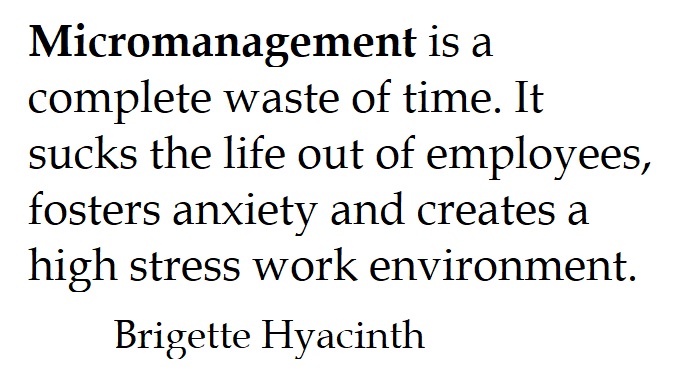[19 June 2021] Day 19 of fmco* in Malaysia
Yesterday, a friend sent me a link to a Facebook post (someone else’s) that talked about how his company micro-manages them now during the lockdowns. I was amazed at the extreme this company went to micro-manage.
The company had installed a screen activity tracker on the computers that are used by the employees. The system sits in the background and tracks if there are any mouse movement or typing activity on the computer. After a certain period, if they detect that there are none, a window will pop up to verify why they have been idle. The system will ask if they are still on the break or if they want to continue working. And the system will screenshot everything that is displayed on the computer. (Alert: this may have broken some privacy laws if personal data was displayed.)
When I wrote about the invisible leader being visible, this is certainly not what I was referring to. LOL!
Why do people micromanage?
Micro-management involves the close supervision of an employee by a manager. The term has a negative connotation because it stems from distrust and does not promote autonomy. Many are clock-watchers as in the case of using the screen tracker.
There are many reasons employers micro-manage their team members. Fear drives many of the behaviors they exhibit. Here are some common reasons why people micro-manage:
- Loss of control over projects
- Unskilled employees on team
- Belief that work deemed superior to their own may make them look inadequate
- Extreme need for control and domination
- Poor self-image and insecurities
- Inexperience in management
Micro-management is damaging

This distrust damages relationships with your staff. According to Brigette Hyacinth, the long term negative effects on the business are:
- Decreased productivity
- Reduced innovation
- Lower morale
- High staff turnover
If you think you have a tendency to micro-manage, take time to do self assessment. What is the real fear, deep down? Perhaps, it’s not fear but you need to learn how to teach, not tell.
fmco = Full Movement Control Order
About the Author: Gina Phan is a consultant and trainer with Zinfinity Consulting. She currently conducts courses in workplace performance skills. Click here to contact her, follow her on Facebook or connect with her on Linkedin.
#micromanage #micromanager #fear #leadership #management
#trainergina #ginaphan #gp
(Feature Image by Gerd Altmann from Pixabay.)



Hahahahaha
Are you talking about this post:
https://www.facebook.com/1824087018/posts/10215908010892858/?d=n
I have never heard of people doing this ever!
I can neither confirm nor deny it.
🙂
If bosses want to micromanage so closely, please do reimburse the extra electricity and in some cases, the increase in internet costs to the individual working from home. Likewise, enployees should be truthful and not utilise the WFH hours watching Netflix etc.
So true. Bosses should consider those too.
It’s better to measure results than to measure time at work. Sometimes, it’s counter intuitive.
Which is a better plumber? The one who can fix your problem in 5 minutes or the one who take 2 hours to do it?
I remember a customer complaining that my technical staff do not spend enough time on their system so it’s not worth the money she pays for maintenance. I told her that our staff are good enough to solve the problem faster than others. 🙂
I had one co-worker who I totally don’t need to monitor at all. Why? Because her work is excellent, and on time (even before time). Sometimes, I haven’t even finished my sentence, she has solved my problem already. Really, that good! She can watch youtube all day for all I care.
When I was a junior, I used to fall asleep at my table sometimes. My boss would see this when he walks out of his office, then closed his door quietly so that it doesn’t wake me up. He told me it’s because I will do better work once I have gotten my rest.
Thanks for your input.
Micromanagement is often used by employer or superior to pressure undesirable staff to resign. Better known as constructive dismissal meaning involuntary resignation.
Sneaky! What a big delta in value system between employer and employee. I believe the employee is better off working for someone else, in this case.